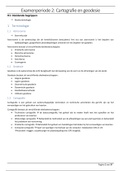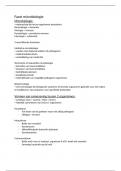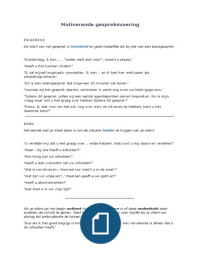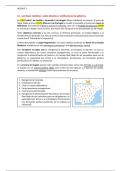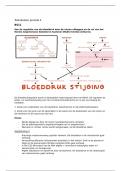PSYCHOLOGY OF SEXUALITY
Book: Lehmiller, J. J. (2017). The Psychology of Human Sexuality. 2nd edition. Oxford, UK:
Wiley-Blackwell. ISBN: 978-1-119-16473-9
With the exception of chapter 12
Recommended Readings: Come As You Are: The Surprising New Science that Will
Transform Your Sex Life
SEX
- Noun: Biological. Female/ Male. Assigned at Birth. not always congruent with
gender.
- Verb: Action.
HOW DO PEOPLE HAVE SEX?
- Asexuality vs. Allosexuality
- Voluntary vs. Involuntary celibacy (INCEL)
- Partnered Sexual Behaviour
- Kissing
- Touching
- Manual sex
- Oral
- Anal
- Vaginal
- non-consensual sex isn't sex
- Coital Imperative: “real sex” involves the penetration of the vagina
with the penis. This is central to “normal” heteronormativity.
- Solitary Sexual Behaviour
- Masturbation
- Sexual Fantasy: any mental picture that comes to mind while awake. Turns
you on.
- Most common:
- Multipartner sex
- BDSM
- Novelty, adventure, variety
WHAT IS SEX?
- More than coitus
- All behaviour that arouses us
- Mostly focused on genitals
- Often leads to orgasm
- Sex is only sex if the partners consent
WHY DO PEOPLE HAVE SEX?
- Procreation
, - Recreation
- Relation (to confirm the intimacy of a relationship)
- Insecurity (to raise self-esteem/ not knowing how to say no)
SEX AND CULTURE: VIEWS ON SEXUALITY
- The traditional Christian view:
- Sex is an urge/instinct
- Radical point of view
- SIN - you have to control your sexual urges
- Coitus between men and women with the purpose of procreation
- Missionary position
- Heterosexual
- Marriage
- Consequences of this view:
- No sex-ed
- No prostitution
- No contraceptives
- No abortion
- No masturbation
- No sex before or outside of marriage
- No oral
- No anal
- No homosexuality
The relationship between religiosity and sexuality is mostly of religion trying to limit sexual
activity and pleasure that does not align with religious values (depends on religion).
- Conversion therapy is a practice that tries to change sexual preference, behaviour and
gender identification.
- Victorian Era/ traditional Science view:
- Taboo
- No talk about sex
- Sexual fantasies had to be suppressed
- Porn and prostitution
- Invention of vibrator
- As an aid for pelvic massage to cure hysteria (story).
- “Scientific”
- Degeneracy theory: admitting to lust leads to biological
decline. Sexual desire is bad for health.
- The main focus is on masturbation.
Hysteria: many women were diagnosed, and it was thought that blood went from the uterus to
the brain and caused hysteria.
- Social view:
- Sexuality is anti-social and destructive drive
- Admitting to that drive results in anarchy
- Social boundaries are necessary
, - Government has to regulate
- Self-censorship
- Censorship on social media
- The Freudian view:
- superego: prohibitions from parents, society, culture and religion.
(conscience/ morality).
- ego: sensible aspect of the personality. (reality principle).
- id: unconscious sexual drive that always wants to be fulfilled.
(pleasure principle: motivation to seek instant gratification).
- Libido= sexual drive, antisocial and destructive
- Giving in to that urge gives anarchy
- Fehlleistung (freudian slip): make secret wish known by mistake
(porn/corn)
- Freudian dream symbols
- Women hysteria
- Sublimation: deflecting sexual instincts into acts of higher social
valuation
- The radical political view:
- Sexuality is a powerful drive
- Suppressing that drive is unnatural
- Sexuality is something good
- Civilization suppressed and destroys “the innocent and noble sexual
impulse”
- Wilhelm Reich: the solution is a perfect orgasm “orgastic potency”
- There is no reason to be ashamed of an orgasm
- Sex is something positive BUT but a good orgasm is only
possible within heterosexual coitus.
- The simple learning view:
- Stimulus-seeking behaviour
- Pleasure-seeking behaviour
- Sex is a desire that you actively shape, is a natural and healthy human
activity.
- Sex is pleasant also for women
- Sexuality is something you learn
- Little room for cognitive and behavioral aspects of sexuality (thoughts,
feelings, images, fantasies, love)
- Emphasis on sexual techniques (in education and therapy)
- Master’s and Jhonson’s human sexual response cycle (biology)
Book: Lehmiller, J. J. (2017). The Psychology of Human Sexuality. 2nd edition. Oxford, UK:
Wiley-Blackwell. ISBN: 978-1-119-16473-9
With the exception of chapter 12
Recommended Readings: Come As You Are: The Surprising New Science that Will
Transform Your Sex Life
SEX
- Noun: Biological. Female/ Male. Assigned at Birth. not always congruent with
gender.
- Verb: Action.
HOW DO PEOPLE HAVE SEX?
- Asexuality vs. Allosexuality
- Voluntary vs. Involuntary celibacy (INCEL)
- Partnered Sexual Behaviour
- Kissing
- Touching
- Manual sex
- Oral
- Anal
- Vaginal
- non-consensual sex isn't sex
- Coital Imperative: “real sex” involves the penetration of the vagina
with the penis. This is central to “normal” heteronormativity.
- Solitary Sexual Behaviour
- Masturbation
- Sexual Fantasy: any mental picture that comes to mind while awake. Turns
you on.
- Most common:
- Multipartner sex
- BDSM
- Novelty, adventure, variety
WHAT IS SEX?
- More than coitus
- All behaviour that arouses us
- Mostly focused on genitals
- Often leads to orgasm
- Sex is only sex if the partners consent
WHY DO PEOPLE HAVE SEX?
- Procreation
, - Recreation
- Relation (to confirm the intimacy of a relationship)
- Insecurity (to raise self-esteem/ not knowing how to say no)
SEX AND CULTURE: VIEWS ON SEXUALITY
- The traditional Christian view:
- Sex is an urge/instinct
- Radical point of view
- SIN - you have to control your sexual urges
- Coitus between men and women with the purpose of procreation
- Missionary position
- Heterosexual
- Marriage
- Consequences of this view:
- No sex-ed
- No prostitution
- No contraceptives
- No abortion
- No masturbation
- No sex before or outside of marriage
- No oral
- No anal
- No homosexuality
The relationship between religiosity and sexuality is mostly of religion trying to limit sexual
activity and pleasure that does not align with religious values (depends on religion).
- Conversion therapy is a practice that tries to change sexual preference, behaviour and
gender identification.
- Victorian Era/ traditional Science view:
- Taboo
- No talk about sex
- Sexual fantasies had to be suppressed
- Porn and prostitution
- Invention of vibrator
- As an aid for pelvic massage to cure hysteria (story).
- “Scientific”
- Degeneracy theory: admitting to lust leads to biological
decline. Sexual desire is bad for health.
- The main focus is on masturbation.
Hysteria: many women were diagnosed, and it was thought that blood went from the uterus to
the brain and caused hysteria.
- Social view:
- Sexuality is anti-social and destructive drive
- Admitting to that drive results in anarchy
- Social boundaries are necessary
, - Government has to regulate
- Self-censorship
- Censorship on social media
- The Freudian view:
- superego: prohibitions from parents, society, culture and religion.
(conscience/ morality).
- ego: sensible aspect of the personality. (reality principle).
- id: unconscious sexual drive that always wants to be fulfilled.
(pleasure principle: motivation to seek instant gratification).
- Libido= sexual drive, antisocial and destructive
- Giving in to that urge gives anarchy
- Fehlleistung (freudian slip): make secret wish known by mistake
(porn/corn)
- Freudian dream symbols
- Women hysteria
- Sublimation: deflecting sexual instincts into acts of higher social
valuation
- The radical political view:
- Sexuality is a powerful drive
- Suppressing that drive is unnatural
- Sexuality is something good
- Civilization suppressed and destroys “the innocent and noble sexual
impulse”
- Wilhelm Reich: the solution is a perfect orgasm “orgastic potency”
- There is no reason to be ashamed of an orgasm
- Sex is something positive BUT but a good orgasm is only
possible within heterosexual coitus.
- The simple learning view:
- Stimulus-seeking behaviour
- Pleasure-seeking behaviour
- Sex is a desire that you actively shape, is a natural and healthy human
activity.
- Sex is pleasant also for women
- Sexuality is something you learn
- Little room for cognitive and behavioral aspects of sexuality (thoughts,
feelings, images, fantasies, love)
- Emphasis on sexual techniques (in education and therapy)
- Master’s and Jhonson’s human sexual response cycle (biology)



